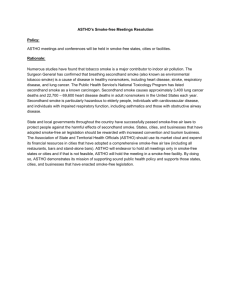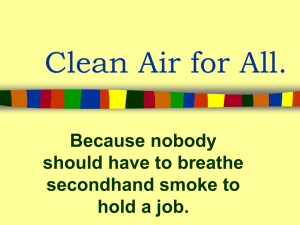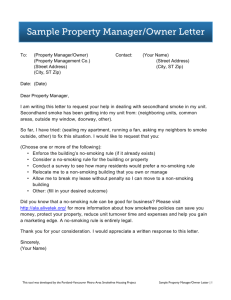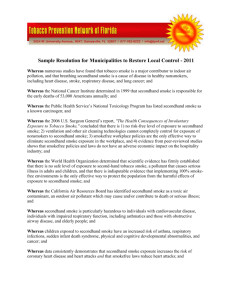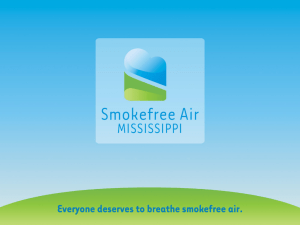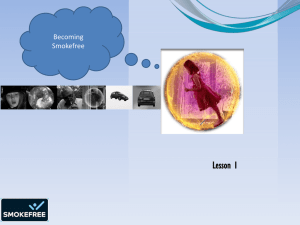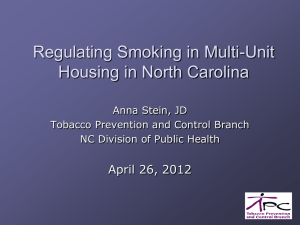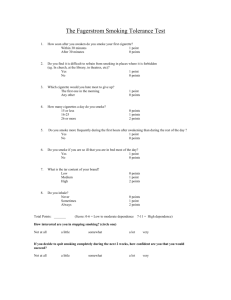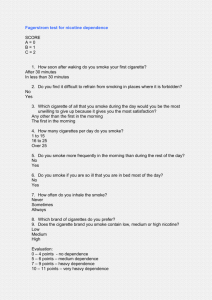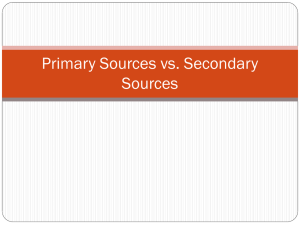Plan for DRP funds related to clean air
advertisement
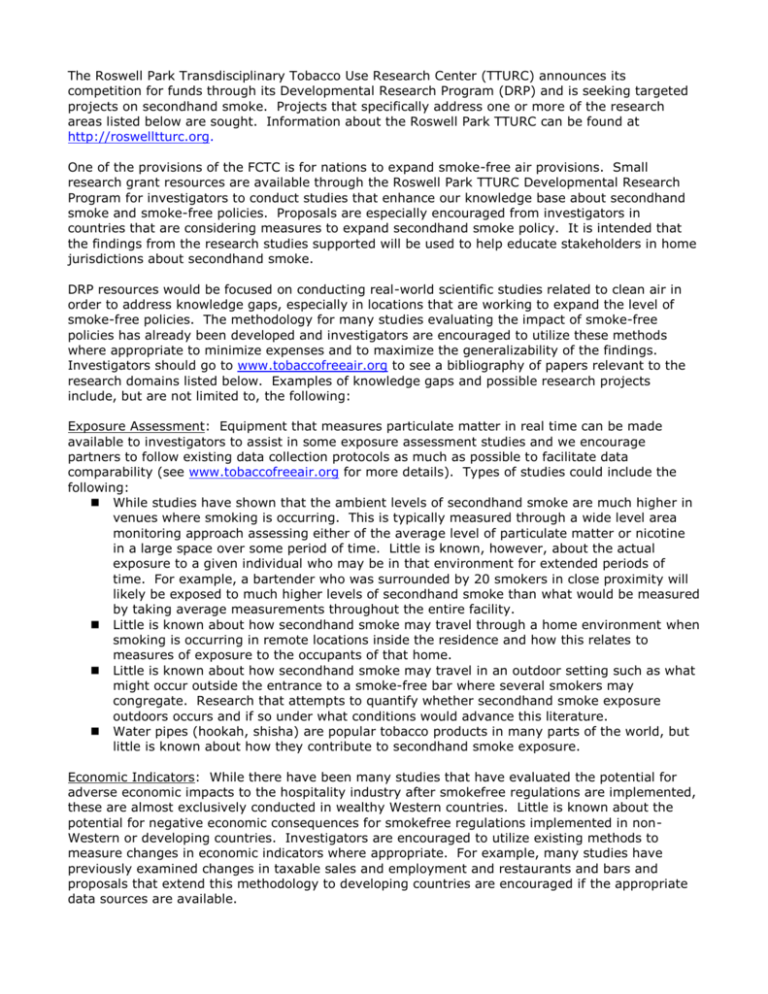
The Roswell Park Transdisciplinary Tobacco Use Research Center (TTURC) announces its competition for funds through its Developmental Research Program (DRP) and is seeking targeted projects on secondhand smoke. Projects that specifically address one or more of the research areas listed below are sought. Information about the Roswell Park TTURC can be found at http://roswelltturc.org. One of the provisions of the FCTC is for nations to expand smoke-free air provisions. Small research grant resources are available through the Roswell Park TTURC Developmental Research Program for investigators to conduct studies that enhance our knowledge base about secondhand smoke and smoke-free policies. Proposals are especially encouraged from investigators in countries that are considering measures to expand secondhand smoke policy. It is intended that the findings from the research studies supported will be used to help educate stakeholders in home jurisdictions about secondhand smoke. DRP resources would be focused on conducting real-world scientific studies related to clean air in order to address knowledge gaps, especially in locations that are working to expand the level of smoke-free policies. The methodology for many studies evaluating the impact of smoke-free policies has already been developed and investigators are encouraged to utilize these methods where appropriate to minimize expenses and to maximize the generalizability of the findings. Investigators should go to www.tobaccofreeair.org to see a bibliography of papers relevant to the research domains listed below. Examples of knowledge gaps and possible research projects include, but are not limited to, the following: Exposure Assessment: Equipment that measures particulate matter in real time can be made available to investigators to assist in some exposure assessment studies and we encourage partners to follow existing data collection protocols as much as possible to facilitate data comparability (see www.tobaccofreeair.org for more details). Types of studies could include the following: While studies have shown that the ambient levels of secondhand smoke are much higher in venues where smoking is occurring. This is typically measured through a wide level area monitoring approach assessing either of the average level of particulate matter or nicotine in a large space over some period of time. Little is known, however, about the actual exposure to a given individual who may be in that environment for extended periods of time. For example, a bartender who was surrounded by 20 smokers in close proximity will likely be exposed to much higher levels of secondhand smoke than what would be measured by taking average measurements throughout the entire facility. Little is known about how secondhand smoke may travel through a home environment when smoking is occurring in remote locations inside the residence and how this relates to measures of exposure to the occupants of that home. Little is known about how secondhand smoke may travel in an outdoor setting such as what might occur outside the entrance to a smoke-free bar where several smokers may congregate. Research that attempts to quantify whether secondhand smoke exposure outdoors occurs and if so under what conditions would advance this literature. Water pipes (hookah, shisha) are popular tobacco products in many parts of the world, but little is known about how they contribute to secondhand smoke exposure. Economic Indicators: While there have been many studies that have evaluated the potential for adverse economic impacts to the hospitality industry after smokefree regulations are implemented, these are almost exclusively conducted in wealthy Western countries. Little is known about the potential for negative economic consequences for smokefree regulations implemented in nonWestern or developing countries. Investigators are encouraged to utilize existing methods to measure changes in economic indicators where appropriate. For example, many studies have previously examined changes in taxable sales and employment and restaurants and bars and proposals that extend this methodology to developing countries are encouraged if the appropriate data sources are available. Compliance. Like the economic studies, few studies of compliance with smoke-free regulations have been conducted in non-Western or developing countries, and research into issues specific to these parts of the world is important for understanding issues related to implementation of smokefree policies. Previous studies have relied on physical observation of smoking in a sample of businesses to assess compliance. See www.tobaccofreeair.org for some of these studies. Public Support. Relatively little is also known about public support for stronger smokefree policies in non-Western or developing countries. We encourage investigators to utilize appropriate questions from the ITC survey to assess public support for smokefree regulations. Legal Issues. In some cases, there are legal barriers to implementing stronger smokefree regulations. It is anticipated that these will differ from jurisdiction to jurisdiction; however, legal research that addresses legal barriers and provides potential solutions that could be generalizable to other jurisdictions would be valuable. Health Indicators. Relatively little is known about short-term and long-term health status indicators that change after smokefree policies are implemented either in the home or public place setting, especially in non-Western or developing countries. Potential projects could range from surveillance of health indicators utilizing existing administrative records to a clinical assessment of health status. Funded partners will need to have an experienced tobacco control investigator working on the ground in their home jurisdiction, and they will be required to provide matching support of at least an equal dollar value of the award to maximize the impact of the DRP resources. Matching support could be in the form of personnel, reallocation of existing resources to focus on secondhand smoke issues, and/or a hard dollar match. In addition, funded partners must have an NIH approved Institutional Review Board before submitting a research proposal, and proposals from institutions that do not have an Institutional Review Board will not be reviewed. Funded partners will work closely with TTURC investigators throughout the funding cycle so that research efforts can be coordinated in a manner that is beneficial to the funded partners and to the TTURC. Investigators from low and middle income countries are encouraged to apply. It is expected that any given award will be no more than $10,000 and we hope to fund between five and 10 partners in this funding cycle. Applications should be submitted online at http://www.tobaccofreeair.org/rfa.htm. Proposals should be no more than three single spaced pages. The application deadline is as follows: - - September 1, 2006: Electronic proposals due. Proposals rated according to their responsiveness to specific research objectives enumerated above, the track record of the applicant, the level of leveraged resources contributed, and the overall integration with the broader Roswell Park Cancer Institute TTURC. December 1, 2006: Funding announcements made. Investigators can direct questions via email or phone to Craig Steger, TTURC Scientific Administrator. Craig Steger, M.A. Scientific Administrator, Roswell Park TTURC and Department of Health Behavior Division of Cancer Prevention & Population Sciences Roswell Park Cancer Institute craig.steger@roswellpark.org Phone: 716-845-8170 Fax: 716-845-1265
